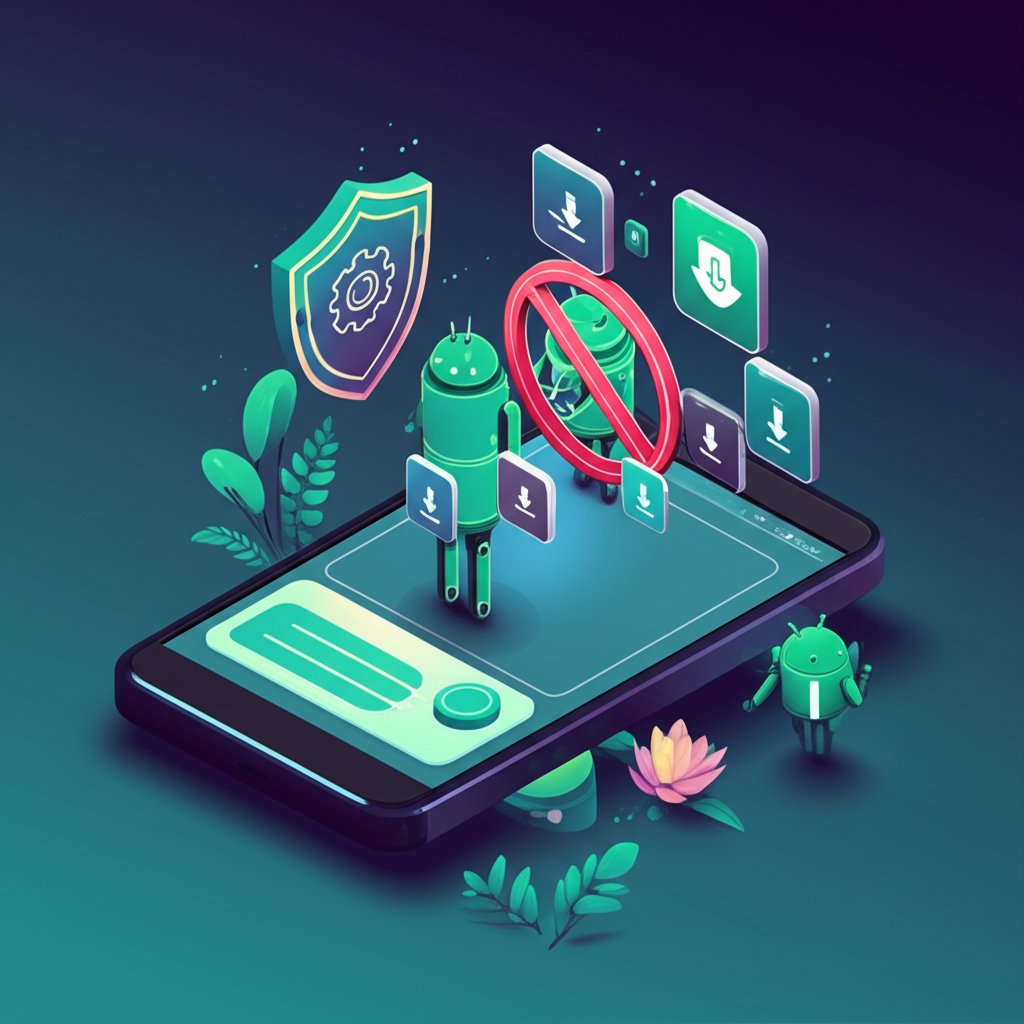You unlock your phone, ready to check your messages, and there it is: a new game or utility app you’ve never seen before, sitting on your home screen as if it belongs there. You’re not losing your mind, and your memory isn’t failing. The frustrating question of “why is my android phone downloading apps by itself” is a surprisingly common issue, turning your personal device into a billboard for unwanted software.
It’s an unsettling experience that can range from a minor annoyance to a serious security threat. But before you consider throwing your phone against a wall, know this: you can regain control. The causes are usually straightforward, and the fixes are well within your reach. This guide will walk you through every possible culprit and provide a clear, step-by-step action plan to put a stop to it for good.
At a Glance: The Quick Fixes
If you’re in a hurry, here are the most common reasons your phone is installing apps on its own and what to do about it:
- Carrier Bloatware: Your mobile provider (like Verizon or T-Mobile) often uses a “manager” app to push promotional software. You can usually disable this system app.
- Aggressive Malware: You may have accidentally installed an app with malware that’s now downloading other apps in the background. A security scan is your first line of defense.
- App Store Settings: The Google Play Store or Samsung Galaxy Store might be set to automatically update or install recommended apps. A quick trip to the settings can fix this.
- Compromised Account: If someone else has access to your Google account, they can remotely install apps on your phone. Securing your account is critical.
The Usual Suspects: Decoding the Automatic Downloads

To solve the problem, we first have to play detective. The unwanted app on your screen is just a symptom; the real cause is hiding in your phone’s settings, a pre-installed system app, or something more malicious. Let’s shine a light on the three most likely culprits.
Is It Your Carrier? The Hidden World of Bloatware
You bought the phone, so you should control what’s on it, right? Unfortunately, mobile carriers often disagree. They bundle their devices with pre-installed software, commonly known as “bloatware,” that can’t be easily uninstalled. Some of these apps are designed specifically to push more apps onto your device.
These aren’t technically malware, but their behavior is just as invasive. They operate under the guise of “helping” you discover new content or “optimizing” your device.
- Verizon App Manager: A notorious example that automatically downloads and installs apps and updates from Verizon’s portfolio.
- T-Mobile AppSelector / AppHub: This prompts users during setup to select apps to install, but can also push suggestions and new apps later on.
- Mobile Services Manager: A more generic name used by various carriers (including AT&T) that can download and install apps in the background without your direct permission.
Think of these apps as overeager salespeople living inside your phone. Their job is to put carrier-partnered apps in front of you, and they often do it automatically.
The Malware Menace: When Your Phone Has a Mind of Its Own
This is the most concerning reason for phantom app installs. Malware or Potentially Unwanted Programs (PUPs) are malicious applications designed to take control of parts of your device for someone else’s benefit. They often sneak onto your phone when you download an app from an unofficial, third-party app store, or click on a deceptive pop-up ad.
Once installed, this malicious app works silently in the background. It can:
- Generate fake clicks on ads to make money for the attacker.
- Steal your personal information, like contacts and login credentials.
- Use your phone’s resources to mine cryptocurrency.
- And, most relevant to our problem, download and install other apps without your consent.
This is a common tactic. The original malware acts as a “dropper,” opening a backdoor to install even more dangerous software or ad-riddled games. This is frequently the answer to the question of[placeholder_link slug="android-games-installing-themselves" text="Why games install themselves"]when you haven’t authorized anything.
Innocent Until Proven Guilty: Checking Your Own Settings
Sometimes, the culprit isn’t a malicious actor but a simple setting you either enabled long ago or that was turned on by default. Before you assume the worst, it’s worth checking these benign but powerful sources of automatic downloads.
- Google Play Store Auto-Updates: While this feature is typically for updating existing apps, certain configurations or partnerships can sometimes lead to new “recommended” apps being installed, especially during device setup.
- Samsung Galaxy Store Auto-Updates: If you have a Samsung device, you have a second app store with its own set of rules. The Galaxy Store can and will install and update apps on its own if you haven’t disabled its automatic settings.
- A Shared or Compromised Google Account: Your Google account is a master key. If a family member is logged into your account on their device, they might be downloading an app, not realizing that the Play Store is set to install it on all associated devices. Worse, if a hacker has your password, they can remotely install spyware or other malicious apps from a web browser anywhere in the world.
- Automatic Restore: Did you recently perform a factory reset or switch to a new Android phone? During setup, Android offers to restore your apps and settings. It will attempt to re-download every app you’ve ever installed with that Google account, which can feel like a sudden, unexplained flood of software.
Your Action Plan: Reclaiming Control of Your Android
Now that you know what you’re looking for, it’s time to take action. Follow these steps methodically, from the simplest fixes to the more advanced solutions. You’ll almost certainly solve the problem along the way.
Start with the Source: Lock Down Your App Stores
Your first stop should be the place where apps are born: the app stores. A few simple tweaks can prevent a whole category of unwanted downloads.
Taming the Google Play Store
This is your primary defense. Let’s tell the Play Store to ask for permission before doing anything.
- Open the Google Play Store app.
- Tap on your profile icon in the top-right corner.
- Select Settings.
- Tap on Network Preferences.
- First, tap App download preference. Choose Ask me every time. This ensures that even over Wi-Fi, you get the final say.
- Next, tap Auto-update apps. Select Don’t auto-update apps. While slightly less convenient, this gives you total control over what changes on your phone.
For Samsung Users: Check the Galaxy Store, Too
Don’t forget Samsung’s walled garden. Its settings are separate from the Google Play Store.
- Open the Galaxy Store app.
- Tap the Menu icon (three horizontal lines).
- Tap the Settings cog in the top-right corner of the menu.
- Turn off Auto update apps. You can set it to “Never.”
The Security Sweep: Finding and Removing Malicious Apps
If tweaking app store settings didn’t work, it’s time to hunt for a more sinister cause. If a [placeholder_link slug="app-appeared-on-my-phone" text="Mysterious app on your phone"], malware is a likely suspect.
Step 1: Run a Malware Scan
Your best weapon is a dedicated security app. These tools are designed to find and destroy malware that hides from plain sight.
- Go to the Google Play Store and download a reputable antivirus app. Malwarebytes is a widely trusted and effective choice.
- Install the app and grant it the necessary permissions to scan your device thoroughly.
- Run a full scan. This may take a few minutes, so let it complete without interruption.
- If the scan finds any threats, follow the app’s instructions to quarantine or remove them immediately.
Step 2: Manually Hunt for Intruders
Sometimes, an app isn’t technically malware but is still an aggressive “adware” app you were tricked into installing. A manual review of your app list can reveal the culprit.
- Go to Settings > Apps > See all apps.
- Carefully scroll through the entire list. Look for:
- Apps you don’t recognize.
- Apps with generic names like “Cleaner,” “Booster,” or “Optimizer.”
- Anything that was installed around the time your problem began.
- If you find a suspicious app, tap on it and select Uninstall. If the uninstall button is grayed out, it may have administrator privileges. Proceed to the next step.
Step 3: Revoke Risky Permissions
Some apps trick you into giving them Device Administrator rights, which makes them very difficult to remove. You need to revoke this power first.
- Go to Settings > Security > Device admin apps (this path can vary slightly; you can also search for “admin” in your settings).
- You’ll see a list of apps with these elevated permissions. Your “Find My Device” app will likely be here, which is normal.
- If you see the suspicious app from the previous step on this list, toggle the switch to OFF or uncheck the box next to it.
- Now, go back to Settings > Apps, find the app again, and the Uninstall button should be active.
Another critical permission to check is Install unknown apps. This allows apps like your web browser to “sideload” software from outside the Play Store. - Go to Settings > Apps > Special app access.
- Tap Install unknown apps.
- Review the list. Your browser (like Chrome) might be “Allowed.” If you don’t intentionally download and install APK files from trusted sources, you should set every app on this list to Not allowed.
Secure Your Digital Lifeline: Your Google Account
A breached Google account is a serious security risk that can manifest as phantom app installs. Take these steps immediately to lock it down.
- Change Your Password: Visit the Google Account security page and create a new, strong, unique password.
- Enable Two-Factor Authentication (2FA): This is the single best thing you can do to protect your account. It requires a second verification step (like a code sent to your phone) when logging in from a new device.
- Review Connected Devices: On the same security page, look for the “Your devices” panel. You’ll see every phone, computer, and tablet currently signed into your account. If you see any you don’t recognize, sign them out immediately.
Advanced Tactics for Stubborn Unwanted Apps

What if the app causing the problem is un-uninstallable carrier bloatware? You can’t remove it, but you can usually put it in a digital straitjacket.
Disabling the Un-Uninstallable: How to Mute Carrier Bloatware
For apps like “Mobile Services Manager” or “Verizon App Manager,” disabling is your best option. A disabled app remains on your phone but cannot run, open, or consume resources in the background.
- Go to Settings > Apps > See all apps.
- Find the offending carrier app (e.g., AppSelector, AppHub, etc.). You may need to tap the three-dot menu and select “Show system” to see it.
- Tap on the app. You’ll see two buttons: Disable and Force Stop.
- First, tap Force Stop.
- Then, tap Disable. You may get a warning that disabling a system app can cause issues, but for carrier bloatware, it is almost always safe. Confirm your choice.
The app will now be dormant, unable to download anything else onto your phone.
The Nuclear Option (With a Safety Net)
If you’ve tried everything and the downloads persist, you might be dealing with deeply embedded malware that’s resisting removal. It’s time to consider the final, most effective solution.
When All Else Fails: The Factory Reset
A factory reset wipes your phone clean, returning it to the state it was in when it first came out of the box. This will erase all your data—apps, photos, messages, settings—and any malware along with it.
Warning: This is a last resort. Before you proceed, you must back up your important data. Use Google Photos for pictures and videos, back up your contacts to your Google account, and use an app like SMS Backup & Restore for your text messages.
- Go to Settings > System > Reset options.
- Select Erase all data (factory reset).
- Confirm your choice and enter your PIN or password. The phone will reboot and begin the wiping process.
After the reset, during the initial setup, be very careful. When Android asks if you want to restore your apps, consider starting fresh and only installing the apps you absolutely need, one by one, from the Play Store. This prevents you from accidentally reinstalling the very problem you just worked so hard to remove.
Build a Digital Moat Around Your Device
You’ve now cleaned your phone and stopped the unauthorized downloads. The final step is to adopt a few simple habits to ensure this never happens again. Protecting your phone is an ongoing practice, not a one-time fix.
Think of it as locking your doors at night. A few seconds of prevention can save you hours of trouble down the line.
- Stick to Official App Stores: The Google Play Store isn’t perfect, but it has robust security (Google Play Protect) that scans for malicious apps. Third-party stores are the wild west; avoid them unless you are an expert user and know the source is trustworthy.
- Be Skeptical of Links and Pop-ups: Never click on ads that claim your phone has a virus or needs “cleaning.” These are almost always scams designed to get you to install malware.
- Read Before You Tap “Allow”: When you install a new app, it asks for permissions. Question why a simple flashlight app needs access to your contacts or why a puzzle game needs to be a device administrator. If a permission request feels wrong, deny it.
- Keep Your Software Updated: Both Android system updates and individual app updates often contain critical security patches that close the loopholes malware uses to get in.
Following this guidance is the most effective way to[placeholder_link slug="how-to-stop-unwanted-apps-from-automatically-downloading-on-android" text="Stop unwanted app downloads"]before they even start. Your phone is an essential tool for modern life; keeping it clean, secure, and under your complete control is worth the small effort.
- How to Stop Apps From Running in the Background to Boost Your - December 1, 2025
- How To Move Apps On Your Droid For Better Organization - November 30, 2025
- How to Move Apps on Android for Better Organization - November 29, 2025










